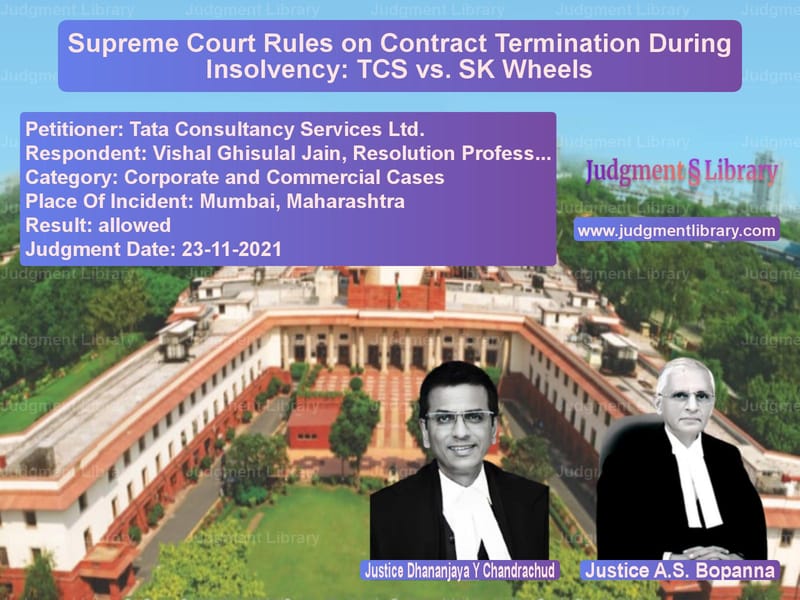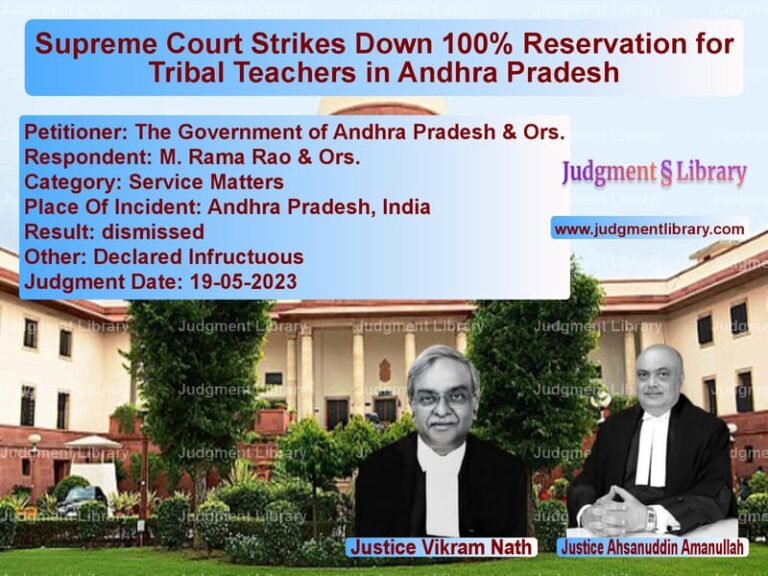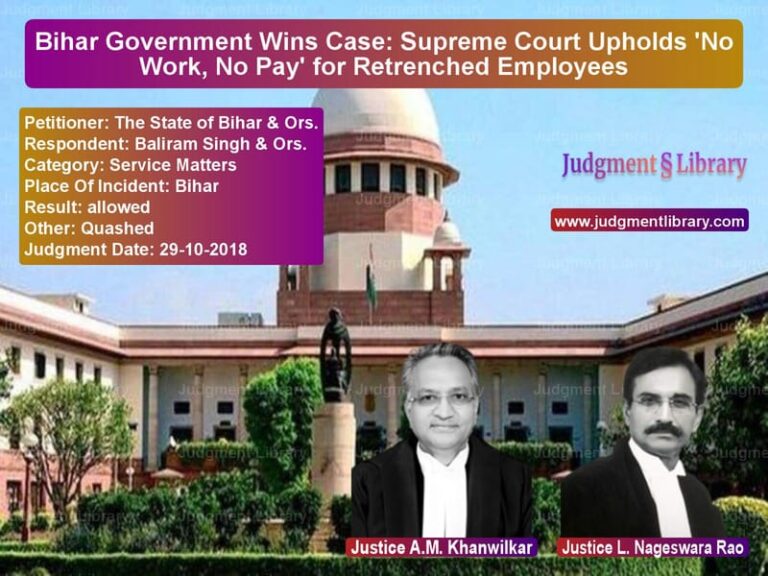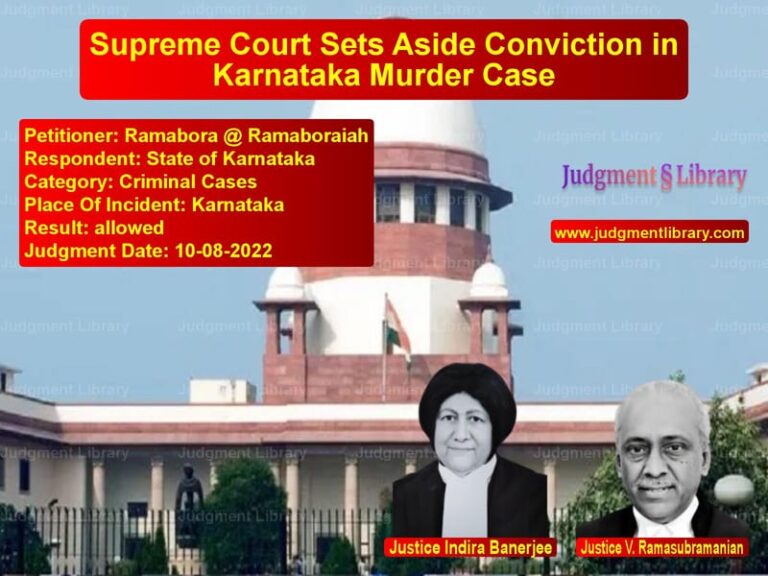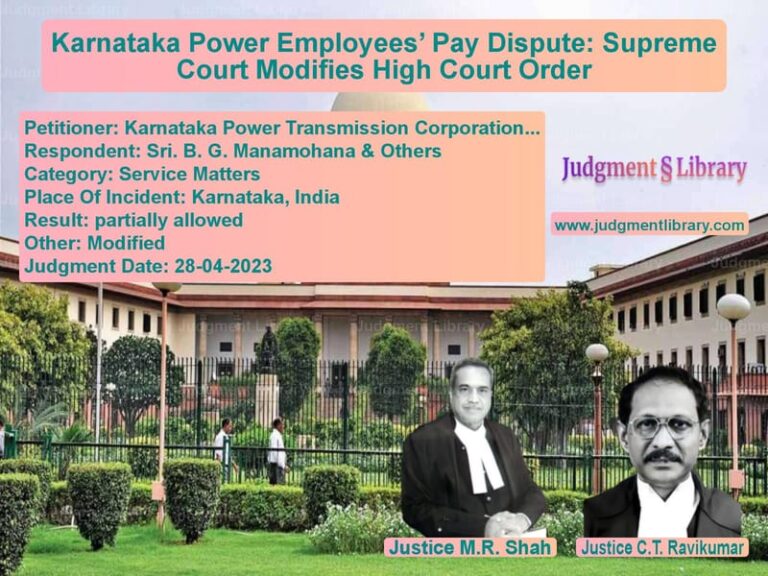Supreme Court Rules on Contract Termination During Insolvency: TCS vs. SK Wheels
The case of Tata Consultancy Services Ltd. vs. Vishal Ghisulal Jain, Resolution Professional, SK Wheels Pvt. Ltd. revolves around the termination of a Facilities Agreement by TCS and whether such termination could be stayed during the Corporate Insolvency Resolution Process (CIRP). The Supreme Court was tasked with determining whether the National Company Law Tribunal (NCLT) and the National Company Law Appellate Tribunal (NCLAT) had the jurisdiction to intervene in the termination of a commercial contract.
Background of the Case
TCS and SK Wheels Pvt. Ltd. entered into a Build Phase Agreement on 24th August 2015, followed by a Facilities Agreement on 1st December 2016. Under this agreement, SK Wheels was to provide premises with specific facilities for conducting TCS’s educational examinations.
Clause 11(b) of the Facilities Agreement allowed either party to terminate the contract with immediate effect if the other party committed a material breach that was not cured within 30 days. The relevant portion of Clause 11(b) states:
“Either party may terminate this Agreement immediately by a written notice to the other Party in the event of a material breach which is not cured within thirty days of the receipt of the said notice period.”
Termination of the Contract
TCS issued a termination notice on 10th June 2019, citing multiple deficiencies by SK Wheels, including:
- Failure to maintain a minimum skill level of staff.
- Non-compliance with furniture and design guidelines.
- Inadequate housekeeping services.
- Branding and navigation inconsistencies.
On the other hand, SK Wheels argued that these were minor operational issues that had been resolved. It also claimed that it had invested Rs. 8.35 crores in fulfilling contractual obligations and that the contract’s termination would severely impact its financial condition.
Initiation of Insolvency Proceedings
On 29th March 2019, before the termination notice was issued, the Corporate Insolvency Resolution Process (CIRP) was initiated against SK Wheels under the Insolvency and Bankruptcy Code (IBC), 2016. SK Wheels contended that TCS was attempting to terminate the contract solely due to the insolvency proceedings.
NCLT and NCLAT Decisions
SK Wheels, through its Resolution Professional, filed an application before the NCLT seeking a stay on the termination. The NCLT granted an interim stay on 18th December 2019, preventing TCS from enforcing the termination and directing it to adhere to the terms of the contract.
The NCLT observed:
“The termination of the contract even without serving a notice to the corporate debtor is not correct. We hereby stay the termination notice issued by the respondent.”
TCS appealed to the NCLAT, which upheld the NCLT’s order on 24th June 2020, reasoning that preserving SK Wheels as a “going concern” was essential under the IBC.
Arguments by the Appellant (TCS)
- The termination was due to persistent contractual breaches and had nothing to do with the insolvency of SK Wheels.
- The NCLT and NCLAT wrongly applied Section 14 of the IBC, which deals with a moratorium on actions against the corporate debtor.
- The contract was a determinable contract under Section 14 of the Specific Relief Act, 1963, and could not be enforced.
- The intervention of the NCLT effectively converted a determinable contract into a non-terminable one, violating contract law principles.
Arguments by the Respondent (Resolution Professional of SK Wheels)
- The contract was critical to the survival of SK Wheels and the CIRP process.
- Termination was a direct consequence of insolvency proceedings, making the dispute a matter under the jurisdiction of the NCLT.
- The NCLT had the power under Section 60(5)(c) of the IBC to intervene in cases where termination affects the going concern status of a company.
Supreme Court’s Observations
The Supreme Court bench, comprising Dr. Dhananjaya Y Chandrachud and A.S. Bopanna, analyzed whether NCLT and NCLAT had the jurisdiction to stay the termination.
The Court held:
“The termination of the Facilities Agreement was based on alleged contractual breaches, and there is no material to indicate that the termination was solely due to the insolvency proceedings.”
The Court made the following key findings:
- The termination of the agreement was not due to insolvency but due to prior contractual breaches.
- IBC’s jurisdiction is limited to matters directly arising from insolvency proceedings. Since the termination was unrelated to insolvency, the NCLT lacked jurisdiction.
- Section 60(5)(c) of the IBC does not grant NCLT unlimited powers to intervene in contractual disputes.
Final Judgment
The Supreme Court ruled that:
- The NCLT and NCLAT exceeded their jurisdiction by staying the termination.
- The termination notice issued by TCS was valid and enforceable.
- The appeal was allowed, and the proceedings before NCLT and NCLAT were dismissed.
Impact of the Judgment
This ruling has significant implications for insolvency law and contract enforcement:
- Limited Scope of NCLT’s Powers: The judgment clarifies that NCLT cannot intervene in purely contractual disputes unless they directly affect the insolvency resolution process.
- Protection of Commercial Autonomy: The ruling ensures that parties can enforce valid contract termination rights without fear of unnecessary intervention by insolvency tribunals.
- Prevention of Misuse of IBC: The decision prevents companies from using CIRP as a shield against contractual obligations.
Conclusion
The Supreme Court’s ruling in TCS vs. SK Wheels reaffirms that insolvency tribunals cannot overreach into purely contractual matters unless termination is explicitly linked to the insolvency process. By restoring the contractual rights of TCS, the judgment upholds the principle that IBC cannot be used to interfere with valid commercial agreements. This landmark decision ensures that corporate insolvency frameworks are used for genuine revival efforts and not to interfere with private contractual rights.
Petitioner Name: Tata Consultancy Services Ltd..Respondent Name: Vishal Ghisulal Jain, Resolution Professional, SK Wheels Pvt. Ltd..Judgment By: Justice Dhananjaya Y Chandrachud, Justice A.S. Bopanna.Place Of Incident: Mumbai, Maharashtra.Judgment Date: 23-11-2021.
Don’t miss out on the full details! Download the complete judgment in PDF format below and gain valuable insights instantly!
Download Judgment: tata-consultancy-ser-vs-vishal-ghisulal-jain-supreme-court-of-india-judgment-dated-23-11-2021.pdf
Directly Download Judgment: Directly download this Judgment
See all petitions in Company Law
See all petitions in Corporate Governance
See all petitions in Bankruptcy and Insolvency
See all petitions in Judgment by Dhananjaya Y Chandrachud
See all petitions in Judgment by A. S. Bopanna
See all petitions in allowed
See all petitions in supreme court of India judgments November 2021
See all petitions in 2021 judgments
See all posts in Corporate and Commercial Cases Category
See all allowed petitions in Corporate and Commercial Cases Category
See all Dismissed petitions in Corporate and Commercial Cases Category
See all partially allowed petitions in Corporate and Commercial Cases Category

